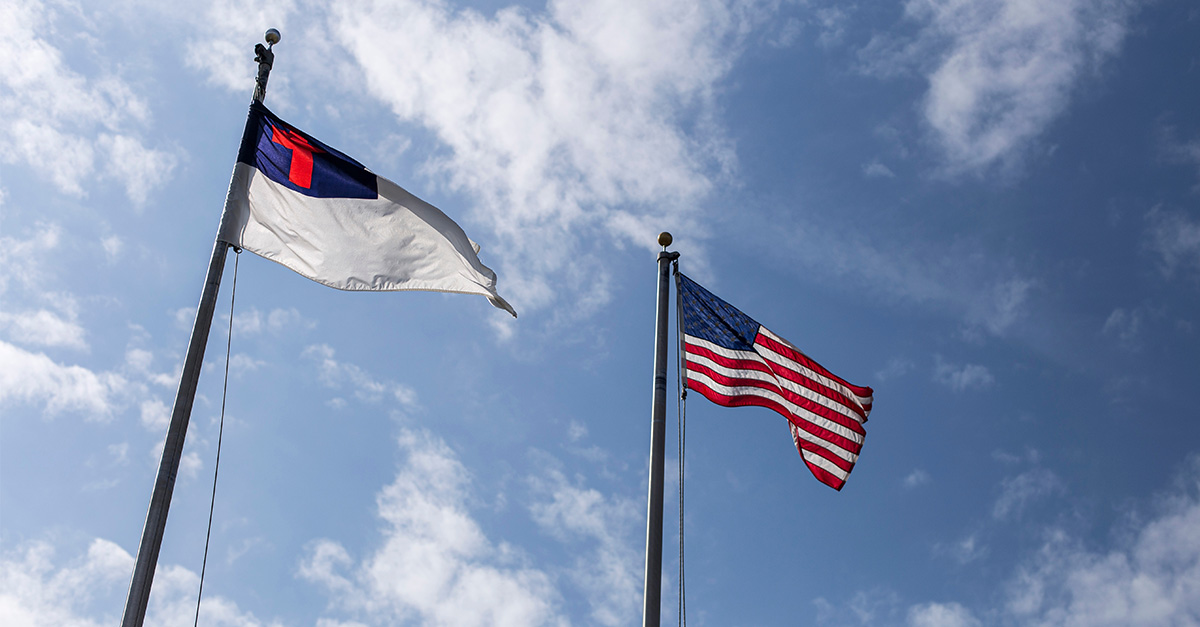


Get a free copy of Parental Rights & Education when you subscribe to our newsletter!

“Is the United States ‘destined’ to go on from strength to strength and glory to glory because we are a ‘shining city on a hill’ or ‘God’s New Israel?’ Well, not exactly. In this article, I want to help rightly define and properly apply the Christian doctrine of providence to the American nation. By doing so, I hope it helps you love God and your country even more, for you will love it more rightly.”
–WILLIAM WOLFE
God’s providence is a wonderful doctrine. When properly understood in its biblical theological context, it is a source of great peace and security for Christians.
But providence is also an expansive doctrine. It covers every area of life — including politics and national destinies. One historical and enduring temptation for Christians is to misapply the doctrine of providence to the future of their nation — and American Christians are no exception.
Speaking of exceptions, I am an enthusiastic believer in what’s known as “American exceptionalism.” The United States is, by God’s grace (emphasis on the grace), and, in my humble opinion (emphasis on the humble), one of the greatest nations to have arisen in the course of human history.
Be that as it may, though, the question remains: Is the United States “destined” to go on from strength to strength and glory to glory because we are a “shining city on a hill” or “God’s New Israel?” Well, not exactly. In this article, I want to help rightly define and properly apply the Christian doctrine of providence to the American nation. By doing so, I hope it helps you love God and your country even more, for you will love it more rightly.
In this two-part series, I aim to accomplish three main tasks. First, I will define the doctrine of providence theologically. Next, I will look at how it has historically been confused in its political application to the United States, first from the 1600s to the 1800s, and then from the 1800s to the present day. Finally, I will share five warnings from a Christian historian, Dr. John Wilsey, that help us apply providence correctly to our American context and understanding of political destiny.
In his recently published magnum opus, entitled Providence, theologian John Piper draws on historic creeds and confessions, Spurgeon’s sermons, and finally, his church’s statement of faith to define providence. He argues that providence is the belief that
“God, from all eternity, to display the full extent of His glory for the eternal and ever-increasing enjoyment of all who love Him, did, by the wisest and holy counsel of His will, freely and unchangeably ordain and foreknow whatever comes to pass.”
Charles Spurgeon, that great Baptist preacher, defined providence as
“Whatever God ordains must be…Fate simply says that the thing must be; Providence says, God moves the wheels along, and there they are. If anything would go wrong, God puts it right; and if there is anything that would move awry, he puts his hand and alters it.”
Or a classic definition from Louis Berkhof’s Systematic Theology renders providence as
“the continued exercise of the divine energy whereby the Creator preserves all His creatures, is operative in all that comes to pass in the world and directs all things to their appointed ends.”
Put simply, providence is God’s specific, careful, sovereign direction of all of history.
Understood correctly, God’s providence is always best interpreted in hindsight. It is not appropriate for humans to look into the future and declare what God will certainly do — with either individuals or a nation. Not only is it not appropriate, the reality is that man simply doesn’t have that ability.
Unfortunately, this is exactly what many American Christians have done throughout our history. One scholar, Conrad Cherry, calls this the “myth of American destiny under God.” He writes that “the history of the American civil religion is a history of the convictions that the American people are God’s New Israel…the belief that America has been elected by God for a special destiny in the world has been the focus of American sacred ceremonies, the inaugural addresses of our presidents…”
This way of thinking about America is evident as early as 1630 when Puritan John Winthrop penned “A Model of Christian Charity” on board the Arabella while anchored off the coast of New England. Winthrop wrote,
“We shall find that the God of Israel is among us when ten of us shall be able to resist a thousand of our enemies; when he shall make us a praise and glory that men shall say of succeeding plantations, ‘the Lord make it likely that of New England.’ For we must consider that we shall be as a city upon a hill. The eyes of all people are upon us.”
Now as wonderful as such hopes were (and are), the reality is that this an unbiblical understanding of God’s providence applied to national destiny. It was certainly good and right for Winthrop to hope and pray that God would do great things in America, but it was overstepping his knowledge to claim that God would surely prosper the new nation.
Still, this conception of unfolding American development as being guaranteed by God’s providential guidance continued through the first 150 years of the colonies and into the Revolutionary War period. In his sermon “The Latter-Day Glory is Probably to Begin in America,” Jonathan Edwards argues that a prophecy from Isaiah 60 “seems plainly to point out America, as the first-fruits of that glorious day” and that “the very uncommon and wonderful circumstances and events of this work, seem to me strongly to argue that God intends it as the beginning or forerunner of something vastly great.”
The religious fervor of the First Great Awakening further stoked the hot flames of the colonists’ perception that they were God’s chosen people. Of course, this was later put to the test in the Revolutionary War. However, Cherry underscores that, for the Founding Fathers, emerging victorious was “interpreted as both a hard-earned opportunity for American self-determination and a proof of God’s blessing on American tasks…God’s New Israel was transformed into a republic; a colonial destiny became a national destiny.”
Click here to read part 2 of this series.
Follow William on Twitter! @William_E_Wolfe
Ready to dive deeper into the intersection of faith and policy? Head over to our Theology of Politics series page where we’ve published several long-form pieces that will help Christians navigate where their faith should direct them on political issues.
